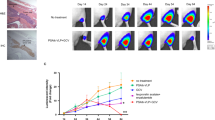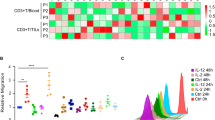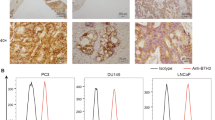Abstract
Advanced prostate cancer (PC) still remains incurable. Novel immunogene therapy shows promise as treatment strategy that can target both localized and metastasized PC. In this study, we have developed a PC-specific oncolytic adenovirus (Ad-PL-PPT-E1A) armed with fusion gene of prostate-specific antigen and CD40 ligand, and aimed to evaluate its therapeutic effect in vitro and in vivo. After they were rescued in human embryonic kidney 293 cells, we confirmed that Ad-PL-PPT-E1A could mediate the expression of E1A efficiently and produce abundant progeny viruses in PC cells in vitro. Our data showed that Ad-PL-PPT-E1A induced apoptosis and resulted in specific oncolytic toxicity in PC cells, which was detected by Annexin-V staining and crystal violet, respectively. After stimulation with lysates, immune phenotypes and cytokines expression of human dendritic cells was detected by flow cytometry and real-time polymerase chain reaction, respectively. And, the results showed that the lysate of Ad-PL-PPT-E1A-infected LNCaP cells upregulated the expression of CD80, CD83, CD86 and mRNA level of interleukin-6 (IL-6), IL-12, IL-23 and tumor necrosis factor-α significantly. In established PC3M cell-xenografted mouse models, Ad-PL-PPT-E1A treatment improved the survival and suppressed the tumor growth obviously. In conclusion, Ad-PL-PPT-E1A exhibited enhanced antitumor activity is a promising approach for gene therapy of advanced PC.
This is a preview of subscription content, access via your institution
Access options
Subscribe to this journal
Receive 12 print issues and online access
$259.00 per year
only $21.58 per issue
Buy this article
- Purchase on Springer Link
- Instant access to full article PDF
Prices may be subject to local taxes which are calculated during checkout





Similar content being viewed by others
Accession codes
References
Jemal A, Siegel R, Ward E, Hao Y, Xu J, Murray T et al. Cancer statistics, 2008. CA Cancer J Clin 2008; 58: 71–96.
Cannata DH, Kirschenbaum A, Levine AC . Androgen deprivation therapy as primary treatment for prostate cancer. J Clin Endocrinol Metab 2012; 97: 360–365.
Sturge J, Caley MP, Waxman J . Bone metastasis in prostate cancer: emerging therapeutic strategies. Nat Rev Clin Oncol 2011; 8: 357–368.
Banchereau J, Paczesny S, Blanco P, Bennett L, Pascual V, Fay J et al. Dendritic cells: controllers of the immune system and a new promise for immunotherapy. Ann NY Acad Sci 2003; 987: 180–187.
O'Neill DW, Adams S, Bhardwaj N . Manipulating dendritic cell biology for the active immunotherapy of cancer. Blood 2004; 104: 2235–2246.
Elgueta R, Benson MJ, de Vries VC, Wasiuk A, Guo Y, Noelle RJ . Molecular mechanism and function of CD40/CD40L engagement in the immune system. Immunol Rev 2009; 229: 152–172.
Xu Y, Song G . The role of CD40-CD154 interaction in cell immunoregulation. J Biomed Sci 2004; 11: 426–438.
Hildenbrand B, Sauer B, Kalis O, Stoll C, Freudenberg MA, Niedermann G et al. Immunotherapy of patients with hormone-refractory prostate carcinoma pretreated with interferon-gamma and vaccinated with autologous PSA-peptide loaded dendritic cells—a pilot study. Prostate 2007; 67: 500–508.
Williams BJ, Bhatia S, Adams LK, Boling S, Carroll JL, Li XL et al. Dendritic cell based PSMA immunotherapy for prostate cancer using a CD40-targeted adenovirus vector. PLoS One 2012; 7: e46981.
Dzojic H, Loskog A, Tötterman TH, Essand M . Adenovirus-mediated CD40 ligand therapy induces tumor cell apoptosis and systemic immunity in the TRAMP-C2 mouse prostate cancer model. Prostate 2006; 66: 831–838.
von Euler H, Sadeghi A, Carlsson B, Rivera P, Loskog A, Segall T et al. Efficient adenovector CD40 ligand immunotherapy of canine malignant melanoma. J Immunother 2008; 31: 377–384.
Xu W, Li Y, Wang X, Wang C, Zhao W, Wu J . Anti-tumor activity of gene transfer of the membrane-stable CD40L mutant into lung cancer cells. Int J Oncol 2010; 37: 935–941.
Zhang L, Tang Y, Akbulut H, Zelterman D, Linton PJ, Deisseroth AB . An adenoviral vector cancer vaccine that delivers a tumor-associated antigen/CD40-ligand fusion protein to dendritic cells. Proc Natl Acad Sci USA 2003; 100: 15101–15106.
Toth K, Dhar D, Wold WS . Oncolytic (replication-competent) adenoviruses as anticancer agents. Expert Opin Biol Ther 2010; 10: 353–368.
Freytag SO, Stricker H, Movsas B, Kim JH . Prostate cancer gene therapy clinical trials. Mol Ther 2007; 15: 1042–1052.
Tuve S, Liu Y, Tragoolpua K, Jacobs JD, Yumul RC, Li ZY et al. In situ adenovirus vaccination engages T effector cells against cancer. Vaccine 2009; 27: 4225–4239.
Alemany R . A smart move against cancer for vaccinia virus. Lancet Oncol 2008; 9: 507–508.
Cerullo V, Pesonen S, Diaconu I, Escutenaire S, Arstila PT, Ugolini M et al. Oncolytic adenovirus coding for granulocyte macrophage colony-stimulating factor induces antitumoral immunity in cancer patients. Cancer Res 2010; 70: 4297–4309.
Tokmadžić VS, Tomaš MI, Sotošek S, Laškarin G, Dominović M, Tulić V et al. Different perforin expression in peripheral Blood and prostate tissue in patients with benign prostatic hyperplasia and prostate cancer. Scand J Immunol 2011; 74: 368–376.
Nencioni A, Grünebach F, Schmidt SM, Müller MR, Boy D, Patrone F et al. The use of dendritic cells in cancer immunotherapy. Crit Rev Oncol Hematol 2008; 65: 191–199.
Aalamian M, Pirtskhalaishvili G, Nunez A, Esche C, Shurin GV, Huland E et al. Human prostate cancer regulates generation and maturation of monocyte derived dendritic cells. Prostate 2001; 46: 68–75.
Pirtskhalaishvili G, Shurin GV, Esche C, Cai Q, Salup RR, Bykovskaia SN et al. Cytokine mediated protection of human dendritic cells from prostate cancer induced apoptosis is regulated by the Bcl-2 family of proteins. Br J Cancer 2000; 83: 506–513.
Cheng WS, Dzojic H, Nilsson B, Tötterman TH, Essand M . An oncolytic conditionally replicating adenovirus for hormone-dependent and hormone-independent prostate cancer. Cancer Gene Ther 2006; 13: 13–20.
Lee SJ, Kim HS, Yu R, Lee K, Gardner TA, Jung C et al. Novel prostate-specific promoter derived from PSA and PSMA enhancers. Mol Ther 2002; 6: 415–421.
Hu ZB, Wu CT, Wang H, Zhang QW, Wang L, Wang RL et al. A simplified system for generating oncolytic adenovirus vector carrying one or two transgenes. Cancer Gene Ther 2008; 15: 173–182.
Acknowledgements
This work was supported by grants from the National High Technology Research and Development Program of China (863 Program) (Nos. 2012AA020807 and 2014AA020515), the National Basic Research and Development of China (973 Program) (No. 2012CB518205) and the National Natural Science Foundation of China (No. 30901379).
Author information
Authors and Affiliations
Corresponding authors
Ethics declarations
Competing interests
The authors declare no conflict of interest.
Additional information
Supplementary Information accompanies this paper on Gene Therapy website
Rights and permissions
About this article
Cite this article
Yang, YF., Xue, SY., Lu, ZZ. et al. Antitumor effects of oncolytic adenovirus armed with PSA-IZ-CD40L fusion gene against prostate cancer. Gene Ther 21, 723–731 (2014). https://doi.org/10.1038/gt.2014.46
Received:
Revised:
Accepted:
Published:
Issue Date:
DOI: https://doi.org/10.1038/gt.2014.46
This article is cited by
-
Potentiating prostate cancer immunotherapy with oncolytic viruses
Nature Reviews Urology (2018)



